This story is part of an ongoing series on Gallup.com on Americans' views on the role and performance of government.
PRINCETON, NJ -- Americans have divided opinions when asked to think broadly about the purpose of government. About as many Americans (35%) prefer an activist government that tries in every way to improve the lives of its citizens as prefer a government that provides only the most basic government functions (37%), with the rest placing themselves between these two positions.
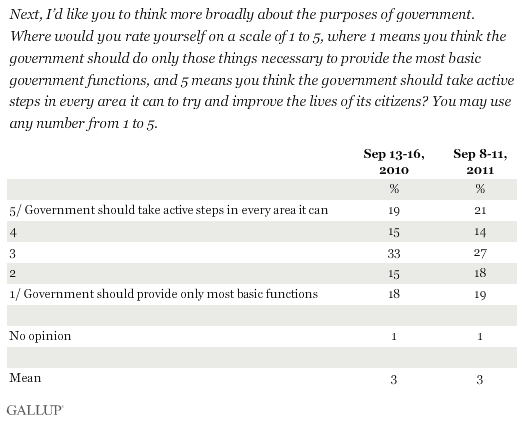
These attitudes, basically unchanged from a year ago, underscore the complex nature of Americans' views of government. Americans have strongly negative views of the way the nation is being governed and of Congress. They also, as will be reviewed here, have significant concerns about the power of the federal government, believe that government is doing too much that individuals and businesses can do, and prefer fewer services and lower taxes. Yet, in a broad sense, Americans are as likely to prefer a more active government as a more limited one.
Majority Perceives Too Much Government Power
A majority (57%) of Americans believe the federal government today has too much power. Most of the rest say the government has about the right amount of power. Few say the government has too little power. Americans were least likely to be concerned about the government's power in the years immediately after 9/11, but half or more since 2005 have said it has too much power.
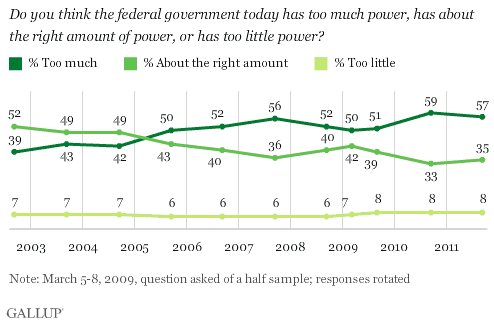
Partisan views about government power are highly dependent on which party controls government, and on the political and social environment at the time of the survey. At this point, 77% of Republicans say the government has too much power, compared with 63% of independents and 32% of Democrats -- which reflects the current Republican position that there is too much government spending and power in domestic and economic affairs.
However, when George W. Bush was president, Democrats were more concerned than Republicans about government power. In Gallup's September 2005 Governance survey, for example, 55% of Democrats said the government had too much power, compared with 50% of independents and 41% of Republicans. At that point, Democrats were almost certainly interpreting this question in terms of government anti-terrorism actions taken after 9/11, including the Patriot Act.
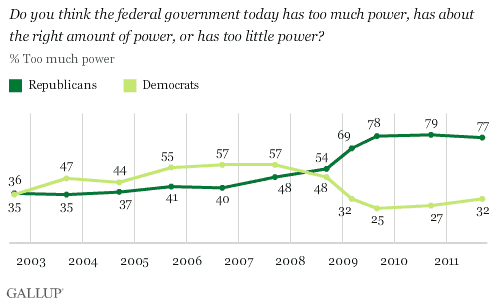
Majority Perceives Too Much Government Regulation of Business
Half of Americans say there is too much government regulation of business and industry, by one percentage point the highest in Gallup's history of asking this question, dating to 1993. Americans were least likely to say the government regulated business too much in February 2002, just months after 9/11 and at a time when President Bush and Congress were involved in efforts to combat terrorism and had high approval ratings. The "too much regulation" attitude held in the 30% range for most of the rest of the last decade, but jumped after President Obama took office in 2009.
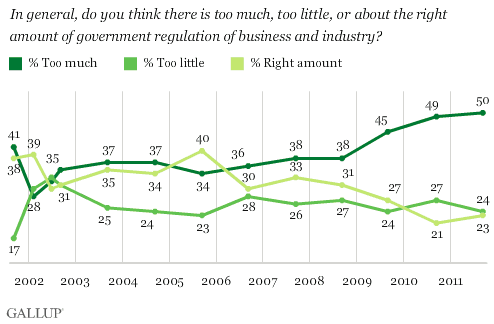
Republicans have consistently been more likely than Democrats to say there is too much government regulation of business, but in recent years, the gap between Republican and Democratic views on this issue has widened substantially.
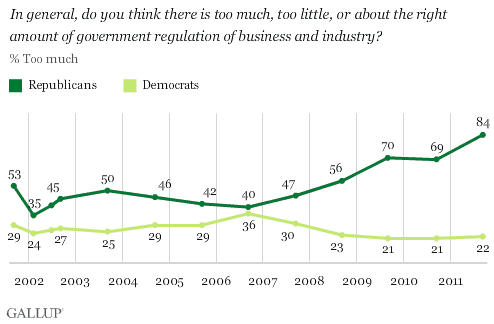
Majority Willing to Trade Off Lower Taxes for Fewer Services
A majority of Americans (56%) say they would be willing to pay less in taxes and accept fewer services, rather than either leaving things as they are now or paying more taxes for more services.
This supports the general position of some conservatives and libertarians, including GOP presidential candidate Ron Paul. They argue that citizens should want their government to do less, and thus collect fewer taxes. Liberals, on the other hand, have focused on the value of the services the government provides, particularly in terms of creating jobs and providing a social safety net, and the necessity of keeping tax revenue flowing in order to fund those services. Fewer than half of Americans, however, currently want to keep or add to the level of taxes and services they have now.
As would be expected, 81% of Republicans would opt for reduced taxes and fewer services, as would 58% of independents. Democrats have more mixed reactions, but about two-thirds would either keep things as they are now (36%) or would opt for more services and more taxes (30%).
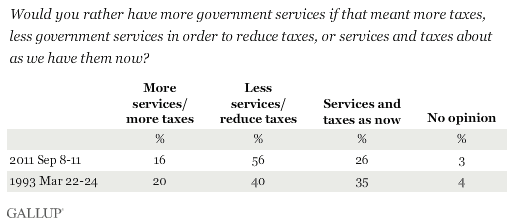
Majority Sees Government Trying to Do Too Many Things
A majority of Americans (56%) believe that government is trying to do too many things that should be left to individuals and businesses, while 39% hold the view that government should do more to solve the nation's problems. Responses to this question have been quite fluid over the two decades in which Gallup has asked the question. In October 2001, in the aftermath of 9/11, 50% said government should do more to solve the country's problems -- the highest in Gallup's history of asking the question. Sentiment that government should do more was lowest in the 1995-1998 time frame, when only about a third held this view and about 6 in 10 said government was doing too much.
Republicans and Democrats respond to this question in extremely different ways, with 88% of Republicans saying the government is doing too much, while 66% of Democrats say the government should do more. Independents tilt toward the "too much" view.
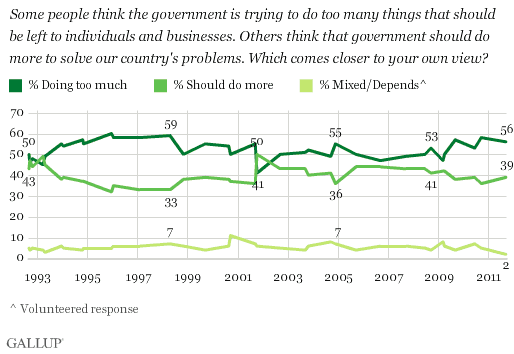
This question produces somewhat different results from those of the 1- to 5-point-scale question on the ideal purpose of government reviewed earlier. One reason may be that this question provides an explicit alternative to the "government doing too much" position -- namely, that the things the government does not do should be left to individuals and businesses.
Implications
Americans currently give the federal government and their representatives in Congress very negative reviews. Americans are dissatisfied with the way the nation is being governed, have record-low confidence in the legislative branch of government, believe that the government has too much power, and that individuals and businesses should be doing more and government less.
Some of these negative views are related to the dismal ratings of the economy. Americans no doubt find it hard to be positive about their political leadership when they perceive that the fundamentals of the national economy are moving in the wrong direction.
Additionally, some of Americans' negative views of the government are related to their perceptions of the efficiency and effectiveness of what the government is doing. They on average believe that 51 cents of every tax dollar is wasted, which may explain some of the negative views and concerns about too much government power. Americans also give the federal government the lowest positive rating of any of 25 business and industry sector rated in August, further suggesting that the people don't think the government works well.
Some of the negative views of government are related to politics. The fact that Democrats were more concerned about government power when Bush was president and Republicans are more concerned about it with Obama as president shows that some people will be negative about the government simply because of political partisanship. Additionally, there are clear philosophical and ideological differences in views of the government that create the dynamic tension that exists in any democratic system, with conservatives generally favoring less government and liberals favoring more government.
One finding in the present review is the degree to which Americans are spread out across the spectrum when asked broadly about their views of the ideal role of government. The results show that the majority of Americans recognize that government has a role and purpose in society. The challenge for elected leaders is to determine which roles and purposes are appropriate and which are not.
Survey Methods
Results for this Gallup poll are based on telephone interviews conducted Sept. 8-11, 2011 with a random sample of 1,017 adults, aged 18 and older, living in all 50 U.S. states and the District of Columbia.
For results based on the total sample of national adults, one can say with 95% confidence that the maximum margin of sampling error is ±4 percentage points.
Interviews are conducted with respondents on landline telephones and cellular phones, with interviews conducted in Spanish for respondents who are primarily Spanish-speaking. Each sample includes a minimum quota of 400 cell phone respondents and 600 landline respondents per 1,000 national adults, with additional minimum quotas among landline respondents by region. Landline telephone numbers are chosen at random among listed telephone numbers. Cell phone numbers are selected using random-digit-dial methods. Landline respondents are chosen at random within each household on the basis of which member had the most recent birthday.
Samples are weighted by gender, age, race, Hispanic ethnicity, education, region, adults in the household, and phone status (cell phone only/landline only/both, cell phone mostly, and having an unlisted landline number). Demographic weighting targets are based on the March 2010 Current Population Survey figures for the aged 18 and older non-institutionalized population living in U.S. telephone households. All reported margins of sampling error include the computed design effects for weighting and sample design.
In addition to sampling error, question wording and practical difficulties in conducting surveys can introduce error or bias into the findings of public opinion polls.
View methodology, full question results, and trend data.
For more details on Gallup's polling methodology, visit www.gallup.com.
